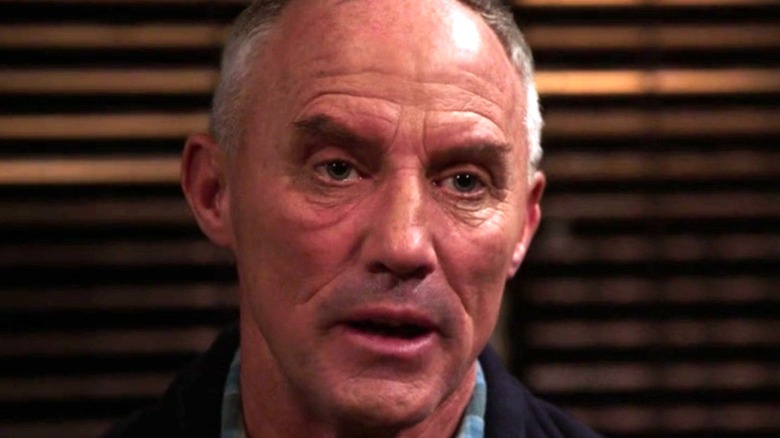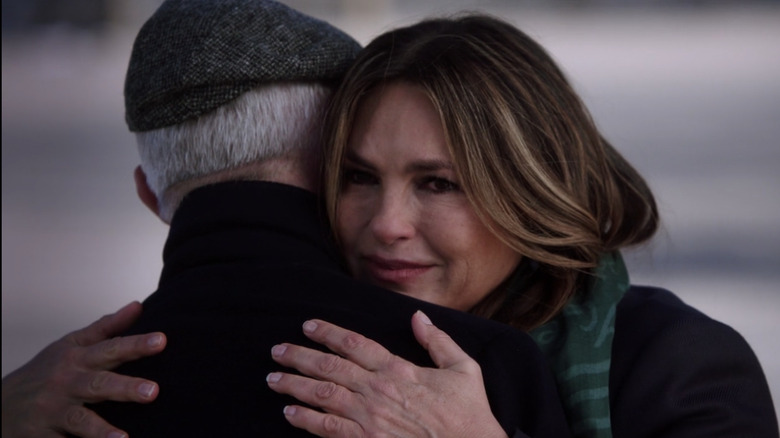Tucker's Tragic Ending On Law And Order: SVU
Long-time fans of Dick Wolf's most successful "Law & Order" spin-off, "Law & Order: Special Victims Unit," are undoubtedly familiar with actor Robert John Burke's memorable portrayal of recurring character Ed Tucker. As the head of the NYPD's Internal Affairs Bureau (IAB), Tucker was often posited as the "bad good guy" antagonist to Detectives Olivia Benson (Mariska Hargitay) and Elliot Stabler (Christopher Meloni). In fact, Tucker spent the better percentage of his time on the show attempting to get one or both detectives demoted or removed from the squad for failing to follow orders or for behaving in ways that, while justified within the context of the plot, might ultimately reflect poorly upon the department.
However, all that changed in Season 17, when the IAB villain and SVU hero (Benson) discovered they had far more in common than they'd previously realized. The two began a romantic relationship and even took a trip to Paris together, but while Tucker was ready to retire and focus on settling down and enjoying the good life, Benson (by this point a Lieutenant) still felt duty-bound to continue protecting the victims of sexual and domestic assault and abuse. Ultimately, the two parted ways in Season 18 and wouldn't be reunited until Season 21, Episode 12, where then happily married Tucker returned with some truly tragic news.
Ed Tucker tells Olivia he's dying
The department gathers to celebrate Ed Tucker's retirement in "The Longest Night of Rain." During the party, a former police officer named Rachel Wilson (Holly Robinson Pete) calls Tucker out for ignoring her rape complaint against a superior officer early on in her career. Wilson takes her own life shortly after that, and Olivia is compelled to investigate her accusation, meaning that for the first time in their often antagonistic, occasionally romantic relationship, it's she who must investigate Tucker and not the other way around. The deaths don't stop with Wilson, and the episode deals simultaneously with the increase in police suicides and the evolution of the department's approach to dealing with the specific struggles faced by female police officers, women of color, and interdepartmental sexual assault.
Tucker ultimately admits to doing a poor job handling Wilson's accusation (against his former partner, no less) and says he "feels terrible" about the lack of justice she received, but something feels off to Olivia about both his recall and his reaction. Eventually, Tucker confesses to Olivia that he's dying of cancer which moved from his lungs into his brain. He also has yet to share this information with his wife.
Olivia and Ed made an emotional amends prior to his death
In the same scene, Tucker explains that he couldn't recall Officer Wilson's case — or Wilson herself — because he's having cognitive problems due to his condition. Once he recalls the events that transpired (including his partner convincing him that he was in a consensual relationship with Wilson), Tucker helps the department charge his former partner with rape by getting him drunk and recording their conversation. Tucker then has an emotional conversation with Olivia. As the two make tearful and heart-wrenching amends, Olivia tells her former lover that she regrets how things ended and that she wishes the two "had more time." Tucker tells Olivia that they'll "always have Paris," and the pair appear to part on good, if sorrowful, terms.
However, in the episode's final scene, Detective Fin Tutuola (Ice-T) finds Olivia crying in her office. "I heard about Tucker," he says, and for a second, the audience is under the impression that Fin is referring to Tucker's cancer. Sadly, he's not. "He took his life with his old .38," Olivia says, before explaining (to the audience, more than Fin) that Tucker left his wife his pension, his benefits, and a letter saying that he didn't want her to spend the last years of their life together caring for "a dying man."


